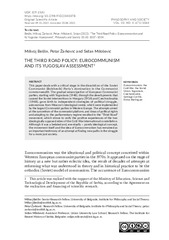Приказ основних података о документу
The Third Road Policy: Eurocommunism and Its Yugoslav Assessment
Politika trećeg puta: evrokomunizam i njegova jugoslovenska procena
| dc.creator | Bešlin, Milivoj | |
| dc.creator | Žarković, Petar | |
| dc.creator | Milošević, Srđan | |
| dc.date.accessioned | 2023-01-11T18:49:47Z | |
| dc.date.available | 2023-01-11T18:49:47Z | |
| dc.date.issued | 2022 | |
| dc.identifier.issn | 0353-5738 | |
| dc.identifier.uri | https://journal.instifdt.bg.ac.rs/index.php/fid/article/view/1523 | |
| dc.identifier.uri | http://rifdt.instifdt.bg.ac.rs/123456789/2752 | |
| dc.description.abstract | This paper deals with a critical stage in the dissolution of the Soviet Communist (Bolshevik) Party’s domination in the Communist commonwealth. The gradual emancipation of European Communist parties, starting with Yugoslavia (1948), through the developments that caused the Soviet interventions in Hungary (1956) and Czechoslovakia (1968), gave birth to independent strategies of political struggle, autonomous from Moscow’s ideological centre, which were implemented by the largest Communist parties in Western Europe. The attempts aimed at the syncretism of the communist platform, and ideas of political rights and adapting to the parliamentary regime resulted in the “Third Road” movement, which strove to unify the positive experiences of the two ideologically opposed sides of the Cold War international constellation. Although it was a belated and, eventually – purely ideological concept, the movement itself and the idea of Eurocommunism has remained as an important testimony of an attempt at finding new paths in the struggle for a more just society. | sr |
| dc.description.abstract | U radu se analiziraju kritični momenti disolucije monolitnog istočnog bloka kojim je domini rala sovjetska komunistička (boljševička) partija. Evolutivna emancipacija evropskih komu nističkih partija počev od Jugoslavije (1948), preko sovjetskih intervencija u Mađarskoj (1956) i Čehoslovačkoj (1968), dovela je do konstituisanja samostalnih i u odnosu na Moskvu ne zavisnih strategija političke borbe, koje su primenjivale najveće komunističke partije u Za padnoj Evropi. Pokušaji sinkretizma komunističke platforme sa idejama poštovanja građan skih prava i adaptacije u parlamentarne režime zapadnih država, oblikovale su pokret “trećeg puta” koji je pokušao da objedini pozitivna iskustva obe ideološki suprotstavljene strane hladnoratovske međunarodne konstelacije. Iako zakasneo i politički nerealizovan, pokret i ideja evrokomunizma su ostali kao važno svedočanstvo o pokušaju pronalaska novih puteva u borbi za pravednije društvo. | sr |
| dc.language.iso | en | sr |
| dc.publisher | Beograd : Institut za filozofiju i društvenu teoriju | sr |
| dc.relation | info:eu-repo/grantAgreement/MESTD/inst-2020/200025/RS// | sr |
| dc.rights | openAccess | sr |
| dc.rights.uri | https://creativecommons.org/licenses/by-nc-nd/4.0/ | |
| dc.source | Filozofija i društvo/Philosophy and Society | sr |
| dc.subject | Eurocommunism | sr |
| dc.subject | the Cold War | sr |
| dc.subject | the Soviet Union | sr |
| dc.subject | Yugoslavia | sr |
| dc.subject | Czechoslovakia | sr |
| dc.subject | Santiago Carrillo | sr |
| dc.subject | Enrico Berlinguer | sr |
| dc.title | The Third Road Policy: Eurocommunism and Its Yugoslav Assessment | sr |
| dc.title | Politika trećeg puta: evrokomunizam i njegova jugoslovenska procena | sr |
| dc.type | article | sr |
| dc.rights.license | BY-NC-ND | sr |
| dc.citation.issue | 4 | |
| dc.citation.volume | 33 | |
| dc.citation.spage | 1037 | |
| dc.citation.epage | 1054 | |
| dc.identifier.doi | 10.2298/FID2204037B | |
| dc.type.version | publishedVersion | sr |
| dc.identifier.fulltext | http://rifdt.instifdt.bg.ac.rs/bitstream/id/9523/bitstream_9523.pdf |

